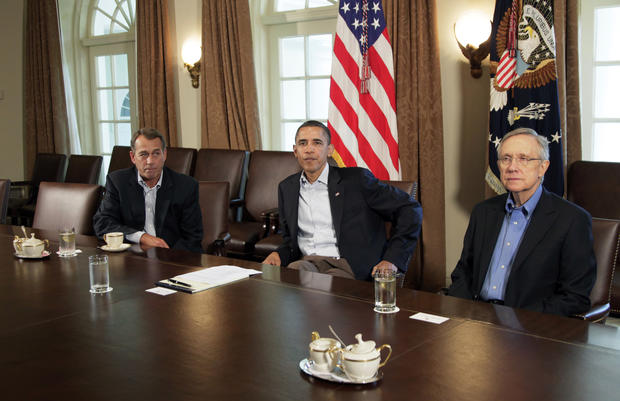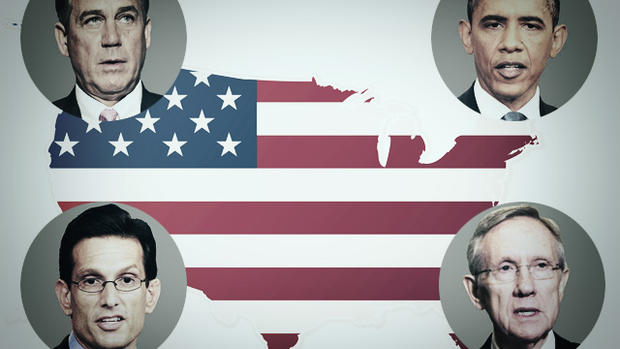As deadline looms, Congress scrambles for debt limit deal
Despite ongoing efforts by congressional leaders to hammer out a deal on Sunday for raising the debt ceiling, all indications suggest that the two parties remain far apart on a viable bipartisan agreement just hours before the opening of the Asian financial markets.
House Speaker John Boehner, who abandoned debt negotiations with the president on Friday, says he is working on the framework for a new deficit reduction proposal, which he hopes to unveil on Sunday. But his proposal is expected to include a two-part plan, with two debt limit increases - and Democrats have repeatedly vowed to fight a short-term package.
Nevertheless, Boehner pledged on Sunday to move forward with a his proposal regardless of Democratic opposition.
"The preferable path would be a bipartisan plan that involves all the leaders, but it is too early to decide whether that's possible," he said in an appearance on "Fox News Sunday." "If that's not possible, I and my Republican colleagues in the House are prepared to move on our own."
CBSNews.com special report: America's debt battleBoehner's $3-4 trillion proposal is expected to include a short-term increase in the debt limit paired with cuts of equal or greater size, along with an agreement to increase the limit again later on - on that occasion paired with spending reforms. Entitlements and mandatory spending would be targeted for reforms and savings, which would be identified either by a commission or by congressional committees.
Boehner argued that it was just "not physically possible" to achieve all of the necessary goals in one step - and alleged that President Obama's objection to the two-step process was derived from his own political interests.
"There will be a two-stage process; it's just not physically possible to do all of this in one step," he said on Fox News. "I know the president is worried about his next election. But my God, shouldn't he be worried about the country? We have got a budget deficit of $1.5 trillion. We're borrowing 42 cents on every dollar we spend, we have $14.5 trillion national debt. It is time to get serious about stopping the spending here in Washington, D.C."
Mr. Obama has repeatedly saidhe will not sign a short-term deal, and argues that the debate over a subsequent raise in the debt ceiling will only grow more contentious as election season moves into full swing.
Why Obama wants to avoid a short-term debt dealObama, Boehner at war over debt talk collapse
John Dickerson: Blame game over debt talks begins
Democratic leadership, too, has vowed to fight any plan that does not raise the debt ceiling through the end of 2012.
"I want to reaffirm my statement from last night: I will not support any short-term agreement, and neither will President Obama nor Leader Pelosi," Senate Majority Leader Harry Reid said in a Saturday night statement. "We seek an extension of the debt ceiling through at least the end of 2012. We will not send a message of uncertainty to the world."
White House Chief of Staff William Daley affirmed on Sunday that Mr. Obama would veto any package that did not raise the limit through 2012.
"The markets of the world do not want to watch this show again in six months if this commission that's being recommended, or committee, does not act in a mere six months," he said in an appearance on CBS' "Face the Nation." "We've been at this for a lot longer than six months. And the Congress cannot seem to get its act together in order to do serious budget reform."
Treasury Secretary Tim Geithner seemed to suggest on Sunday that the so-called "Grand Bargain" option, which included trillions in spending cuts and about a trillion in new revenue, might still be on the table, along with Boehner's new two-step plan.
"There are two types of plans on the table now," Geithner said in an appearance on "Fox News Sunday." "One is the framework that that president and the Speaker of the House have been talking about for the last several weeks now."
Geithner quickly backed away from the idea that the "Grand Bargain" was still in play, however: "Well, I wouldn't say it that way," he said, when asked if the bargain was "still alive." "I'm just saying there's two approaches before us... Something like that comprehensive balance, entitlement savings to secure Medicare and Medicaid for the future with tax reform that would generate revenues," and a plan that would "take default off the table and put in place a special committee with special powers to try to move legislation to achieve that same outcome."
A GOP aide with knowledge of the negotiations told CBS News that Boehner remained willing to talk to Mr. Obama, but that the "Grand Bargain" was no longer a viable option.
"Speaker Boehner has always believed in the need for entitlement reform and tax reform to get our debt under control and create an environment for a growing economy and more jobs, and he always will," Boehner spokesman Michael Steel said. "But as he said this morning, it has become evident that this president just isn't willing to go there. The Speaker believes the best path forward now is to focus on what's doable: a two-tiered approach that reflects the principles of 'Cut, Cap, & Balance.' He is committed to working with his House Republican colleagues and all Members of Congress to enact such a solution."
Also on "Fox News Sunday," Boehner said that despite abandoning negotiations on Friday, his previous offer, which included $800 billion in new revenues and major spending cuts, was still "on the table."
Kyl: Obama prioritizing election over economyDaley: GOP wants "their way or highway" on debt
"My last offer is still out there. I've never taken my last offer off the table," he said.
But that offer, which would include a trigger that could repeal the individual health care mandate and significantly cut Medicaid, is unlikely to gain traction among Democrats.
Nevertheless, Geithner warned that time was running out.
"They need to get this process moving in the House by Monday night," he said on ABC's "This Week." "To achieve that deadline, they need to have a framework that they know with complete confidence will pass both houses of Congress that is acceptable to the president."
Jill Jackson contributed to this report.


